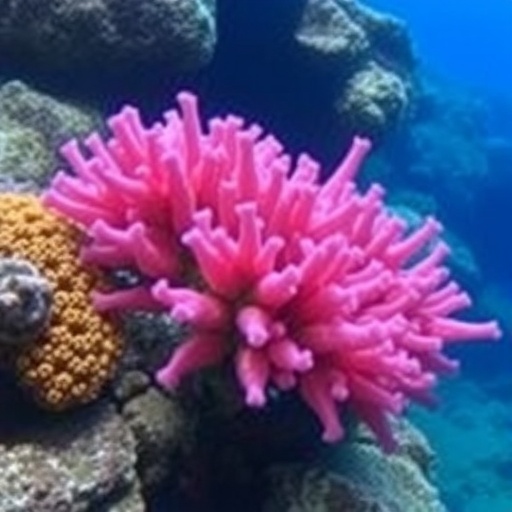Coral reefs, often referred to as the “rainforests of the sea,” exhibit unparalleled biodiversity, housing a myriad of marine species. Recent research conducted by a team led by Ow Yong, W.L., has brought significant attention to the remarkable adaptability and resilience of corals living in marginal and extreme reef environments. This study serves as a critical reminder of how certain coral species can thrive despite challenging conditions, thus providing insights into the broader implications for coral conservation in a changing climate.
The ability of corals to inhabit marginal areas has been observed in various geographical locations. However, the recent findings suggest a far more complex narrative surrounding their distribution and diversity. Through rigorous field surveys and data collection, researchers documented the presence of several coral species that were previously assumed to be absent from these extreme environments. This discovery underscores the importance of ongoing research in understanding coral ecosystems, especially those at the fringes of their typical habitat ranges.
Coral reefs are under increasing threat from climate change, pollution, and overfishing, which have led to widespread coral bleaching and degradation of marine ecosystems globally. In this context, the study by Ow Yong et al. not only illuminates the resilience of certain coral species but also raises critical questions regarding the future of reef ecosystems. With rising sea temperatures and ocean acidification predicted to escalate, one must consider how these stressors will impact coral diversity and distribution moving forward.
One of the most striking aspects of this research is the identification of “corals of opportunity.” These are species that can capitalize on altered environmental conditions typically unsuitable for mainstream coral populations. For instance, the researchers documented several hardy coral species that have developed unique adaptations allowing them to survive in areas characterized by extreme fluctuations in temperature and salinity. Understanding these adaptations could pave the way for future conservation efforts aimed at protecting these vital ecosystems.
In surveying these extreme reef environments, the researchers employed advanced methodologies, including underwater photography and genetic analysis. These techniques not only provided a clearer picture of coral distribution but also facilitated a deeper understanding of genetic diversity among populations. The genetic data collected can shed light on the evolutionary pathways that have enabled these corals to withstand severe environmental conditions and could inform breeding programs aimed at enhancing the resilience of vulnerable species.
The implications of such findings extend far beyond academic interest; they impact global conservation strategies aimed at preserving coral reefs and the myriad species that rely on them. If certain coral species can adapt and thrive under stress, they may serve as a foundational species in efforts to rehabilitate damaged reefs. Consequently, identifying and protecting these opportunistic corals becomes paramount in the face of environmental challenges.
Interestingly, the presence of opportunistic corals could indicate a shift in the dynamics of reef ecosystems. Traditional coral assemblages may begin to give way to these more resilient species, potentially leading to a transformation in the overall structure and function of coral reefs. This shift could have downstream effects on associated marine life, as changes in coral composition influence the entire ecosystem’s food web dynamics.
Further research is needed to explore how these adaptations manifest on a cellular and physiological level. Understanding the biochemistry that allows these corals to survive and thrive in extreme conditions could lead to innovative biotechnological applications. For instance, scientists could examine ways to enhance the resilience of more vulnerable coral species by introducing specific genetic traits observed in opportunistic corals.
These findings also underscore the importance of continued monitoring and data collection in coral reef ecosystems. As environmental conditions evolve, researchers must remain vigilant to identify changes in coral populations. The data gathered through studies like that of Ow Yong et al. can inform long-term conservation strategies, particularly as the world faces increasingly unpredictable oceanic changes.
Additionally, the socio-economic implications of this research cannot be overlooked. Coral reefs are vital to local and global economies, providing essential ecosystem services, including fish nurseries, tourism opportunities, and coastal protection. As coral species adapt to extreme environments, understanding their role in maintaining these services becomes critical to ensuring the livelihoods of millions who depend on healthy reef ecosystems.
In conclusion, the research by Ow Yong and colleagues significantly advances our understanding of coral resilience in extreme conditions. The discovery of corals of opportunity opens new avenues for conservation and restoration efforts aimed at preserving the integrity of reef ecosystems. As the threats to coral reefs continue to escalate, embracing the insights gained from this research could prove crucial for the safeguarding of these irreplaceable marine resources.
Moving forward, it will be essential to cultivate interdisciplinary collaborations that bring together marine biologists, geneticists, and conservationists to maximize the impact of these findings. By integrating scientific knowledge with local conservation practices, we can hope to forge a path towards sustainable reef management and, ultimately, to the survival of these vital ecosystems in an era of unprecedented environmental change.
The study heightens awareness about the undiscovered potential inherent within the natural world. It challenges assumptions regarding coral distribution and diversity while highlighting the importance of perseverance in the face of adversity. As we witness the ongoing changes in our oceans, let the adaptive capacities of corals inspire a collective effort to protect and preserve the wondrous diversity of life within our seas.
Subject of Research: Coral diversity and distribution in extreme reef environments.
Article Title: Diversity and distribution of corals of opportunity in a marginal and extreme reef environment.
Article References: Ow Yong, W.L., Ng, C.S.L., Tanzil, J.T.I. et al. Diversity and distribution of corals of opportunity in a marginal and extreme reef environment. Coral Reefs 44, 1143–1155 (2025). https://doi.org/10.1007/s00338-025-02677-y
Image Credits: AI Generated
DOI: https://doi.org/10.1007/s00338-025-02677-y
Keywords: coral reefs, corals of opportunity, environmental resilience, coral conservation, marine biodiversity, climate change, coral adaptation, genetic diversity, reef ecosystems, ecological dynamics.




